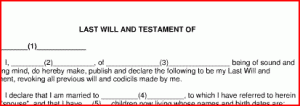 It has been said that two things in life are unavoidable: death and taxes. Most people don’t want to think about their own death, yet doing so can be one of the kindest things we can do for those who would be left behind. How can we pave the way for our loved ones, should the worst happen?
It has been said that two things in life are unavoidable: death and taxes. Most people don’t want to think about their own death, yet doing so can be one of the kindest things we can do for those who would be left behind. How can we pave the way for our loved ones, should the worst happen?
Make sure you have an updated will. Who would care for your children if both you and your spouse were to die? It can be tough to make decisions about who will care for children left behind, but better to make this decision yourself than to have it left to the courts. Rethink your will every few years and update it if changes within your nuclear family (such as the birth of more children) or extended family (aging parents, divorce, etc.) make such changes necessary. Also, how and when will money be distributed to surviving children?
Update your IRA’s and 401 K’s to list a beneficiary. Many people do not realize that in the event of their death, the beneficiary listed on IRA’s and 401K’s will override a will. Make sure to update IRA’s and 401 K’s after significant life events such as marriage or births.
Consider taking out a life insurance policy for yourself, even if you are not the breadwinner. Many families have life insurance for a working spouse, but not for a homemaker. Ask yourself, “What would change if I died, and what would it cost to compensate?” Possible answers include loss of my income, childcare needs, educational expenses, household expenses, etc.
Consider registration of all your accounts. Joint accounts are immediately available to the surviving spouse. Accounts in the deceased spouse’s name are not. Life insurance money is usually not immediately available, either. Try to have enough emergency cash in a joint account to cover immediate bills such as mortgage payments and insurance premiums.
Record all important details and put them in a file, updated yearly. What do you know that your spouse does not ? Do you handle the bills, checking or family medical needs? Record all bank account numbers, passwords, bills, insurance policies, children’s doctors and medical histories, and the names and phone numbers of those your spouse would call to help settle your estate. What does your spouse know that you do not? File copies of this information along with tax returns, bank records, mortgage or leasing documents, insurance policies, birth certificates, social security information and the like. Update the file yearly, or as information changes.





Speak Your Mind